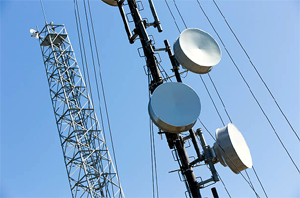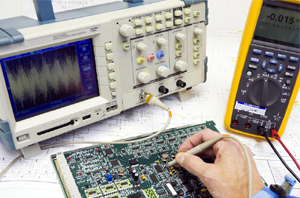Department of Electrical Engineering Jalozai Campus
Electrical Engineering Programme at Jalozai Campus is designed to prepare the students for career in industry and business by providing them with through foundation of the fundamental concepts at undergraduate level while students learn specialized tools about the contemporary electrical engineering during their postgraduate studies. The faculty is dedicated to continue innovation through its programme of academic interaction with the industry and research activities.
Faculty & Staff of Electrical Engineering Jalozai Campus- Academic Programs
- - B.Sc. Electrical Engineering (Communication)
Mission of the B. Sc. Electrical Engineering program:
"To produce competent electrical engineers who can efficiently fulfill professional responsibilities in industrial academic and research organizations."
Program Educational Objectives (PEOs)
PEO 1: The graduates will serve competently in national and international industry or academia by showing requisite knowledge and skills in the field of Electrical Engineering.
PEO 2: The graduates will exhibit quest for learning and professional growth through interpersonal and management skills.
PEO 3: The graduates will demonstrate commitment to ethical practices, communal service and societal contribution.
The PEO 1 deals with the career accomplishments, PEO 2 deals with education and professional development and PEO 3 deals with ethics and community services which contributes to the attainment of University's vision and mission.
Program Learning Outcomes (PLOs)
The Department of Electrical Engineering has adopted the twelve PLOs, defined as minimum outcomes for a graduate in the PEC Manual 2014. The PLOs are reproduced as under:
1. Engineering Knowledge
An ability to apply knowledge of mathematics, science, engineering fundamentals and an engineering specialization to the solution of complex engineering problems.
2. Problem Analysis
An ability to identify, formulate, research literature, and analyze complex engineering problems reaching substantiated conclusions using first principles of mathematics, natural sciences and engineering sciences.
3. Design / Development of Solutions
An ability to design solutions for complex engineering problems and design systems, components or processes that meet specified needs with appropriate consideration for public health and safety, cultural, societal, and environmental considerations.
4. Investigation
An ability to investigate complex engineering problems in a methodical way including literature survey, design and conduct of experiments, analysis and interpretation of experimental data, and synthesis of information to derive valid conclusions.
5. Modern Tool Usage
An ability to create, select and apply appropriate techniques, resources, and modern engineering and IT tools, including prediction and modelling, to complex engineering activities, with an understanding of the limitations.
6. The Engineer and Society
An ability to apply reasoning informed by contextual knowledge to assess societal, health, safety, legal and cultural issues and the consequent responsibilities relevant to professional engineering practice and solution to complex engineering problems.
7. Environment and Sustainability
An ability to understand the impact of professional engineering solutions in societal and environmental contexts and demonstrate knowledge of and need for sustainable development.
8. Ethics
Apply ethical principles and commit to professional ethics and responsibilities and norms of engineering practice.
9. Individual and Teamwork
An ability to work effectively, as an individual or in a team, on multifaceted and /or multidisciplinary settings.
10. Communication
An ability to communicate effectively, orally as well as in writing, on complex engineering activities with the engineering community and with society at large, such as being able to comprehend and write effective reports and design documentation, make effective presentations, and give and receive clear instructions.
11. Project Management
An ability to demonstrate management skills and apply engineering principles to one's own work, as a member and/or leader in a team, to manage projects in a multidisciplinary environment.
12. Life-long Learning
An ability to recognize importance of, and pursue lifelong learning in the broader context of innovation and technological developments.
Field Visits
Visits to various industries and research organizations are a part of education and training of graduate engineers.
These visits are arranged for students to provide them with a window of opportunity through which they get a chance to see actual engineering at work.
- Laboratories The Department has well-equipped laboratories in the following areas
- - Computer Laboratory
- - Electronics Laboratory
- - Digital Electronics Laboratory
- - Electrical Machines Laboratory
- - Microcontroller Laboratory
- - Control Systems Laboratory
- - Electrical Workshop Laboratory
- - Analog, Digital and Fiber Optic Communication Lab
- - Measurement and Instrumentation Laboratory
PEC Accreditation Status
All batches starting Intake 2015 are accredited by Pakistan Engineering Council. The Program is accredited under Level-II (OBE Based Assessment) for Intake 2016,2017,2018.


